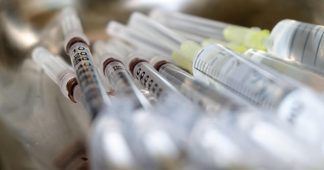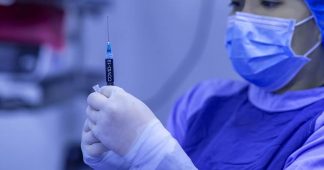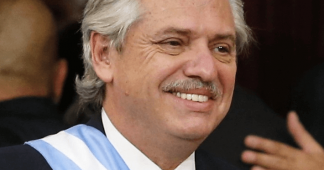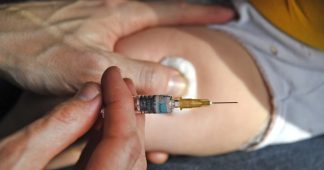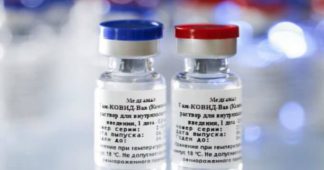“Nobody gives a shit about the overseas workforce,” a former CIA officer complained
By Ken Klippenstein
In early January, as much of the country awaited the Covid-19 vaccine, personnel at the CIA’s headquarters in Langley, Virginia, had already begun receiving their shots, according to three former CIA officials with knowledge of the matter.
Yet the agency has lagged in getting vaccines to overseas personnel, according to former officials. The former officials, many of whom continue to engage in similar work and lacked authorization to speak publicly, were granted anonymity in order to speak freely. While it’s understandable that getting vaccines to war-torn or otherwise impoverished countries, which may currently lack the infrastructure for vaccine distribution, might be difficult, former officials say that the problem has affected field officers in Western Europe.
The failure to vaccinate field officers flies in the face of the agency’s long-standing commitment to prioritizing field officers’ missions and safety; officers still have to go out into crowds to meet with people, even in countries with high rates of Covid-19, former officials explained. “The field is so mad. … Even people who barely go into the office [at HQ] are vaxxed,” one former official told me. “At CIA, they tell you the field comes first.”
“Nobody gives a shit about the overseas workforce,” another former CIA officer complained.
In an ironic twist, CIA personnel in Europe who have grown cynical about Washington’s response are holding out hope that they might receive Russia’s “Sputnik V” vaccine, which some European Union member states have acquired via the black market.
While they acknowledged that getting vaccines to parts of the developing world could be challenging, former officials expressed disappointment and disbelief because the agency specializes in exactly this and can do so with its own fleet of aircraft.
“We got into Afghanistan before the military did, we can get into the worst war zones, but we can’t get into the embassy in London?” one former official remarked.
The prioritization of personnel at the CIA’s headquarters, whose employees largely operate within the building, has rankled people outside the agency as well. Current and former Pentagon intelligence officials expressed outrage that their agencies have had so few personnel vaccinated. One former Defense Intelligence Agency officer who had heard about the CIA headquarters’ vaccinations expressed frustration that hardly any civilians at DIA’s headquarters had been vaccinated. A National Security Agency official conveyed similar concerns.
Diplomats at the State Department, which works closely with the CIA, have reported that the department has prioritized domestic employees over those abroad. Though the State Department denies prioritizing senior leadership, it vaccinated a dozen senior Trump administration appointees before they left the government, according to the New York Times. And as of early January, the United States Agency for International Development had not, for example, vaccinated a single employee, despite being the agency tasked with administering relief, including health services, overseas.
Unlike the many federal employees still waiting to be vaccinated, federal law enforcement officials have enjoyed early access to inoculations. A former law enforcement official at the FBI and a current Department of Homeland Security official told The Intercept that many states granted them the same priority status as first responders and medical professionals, permitting them access to vaccines as soon as they became available in their respective states. (The Federal Law Enforcement Officers Association has also confirmed this.) The Homeland Security official told me that he received his vaccine in early March.
Marc Polymeropoulos, a former senior CIA officer, raised similar concerns about the pace of vaccine distribution to government personnel overseas in a column for the Washington Examiner earlier this month. “Many U.S. government personnel serving overseas are yet to receive a coronavirus vaccine,” he wrote. “They’re wondering why officials in Washington have been vaccinated, while they, on the front lines, remain unprotected.”
It’s unclear why the CIA has been so slow to get vaccines to overseas personnel, but a theme that came up in almost every interview was mistrust of the CIA’s Office of Medical Services. As Doug Wise, a former senior CIA officer, told The Intercept, “While I have no direct knowledge of the vaccine situation, my guess is this issue is a consequence of the lack of trust and confidence in the senior leadership of the agency’s Office of Medical Services.”
“This erosion of trust began with the poor handling, by the OMS leadership, of the microwave attack on agency officers,” he said, referring to the spate of former CIA officers reporting head injuries, often called the “Havana syndrome,” for which the Trump administration refused to grant leave and provide necessary medical care. (The microwave theory is debated.)
Asked about agency headquarters being prioritized, CIA spokesperson Nicole de Haay told The Intercept: “From working closely with U.S. government partners to securing the necessary equipment, CIA continues to go to extraordinary lengths to make Covid-19 vaccines available to our global workforce. Make no mistake, there is no higher priority than the health of our officers.”
Published at theintercept.com
